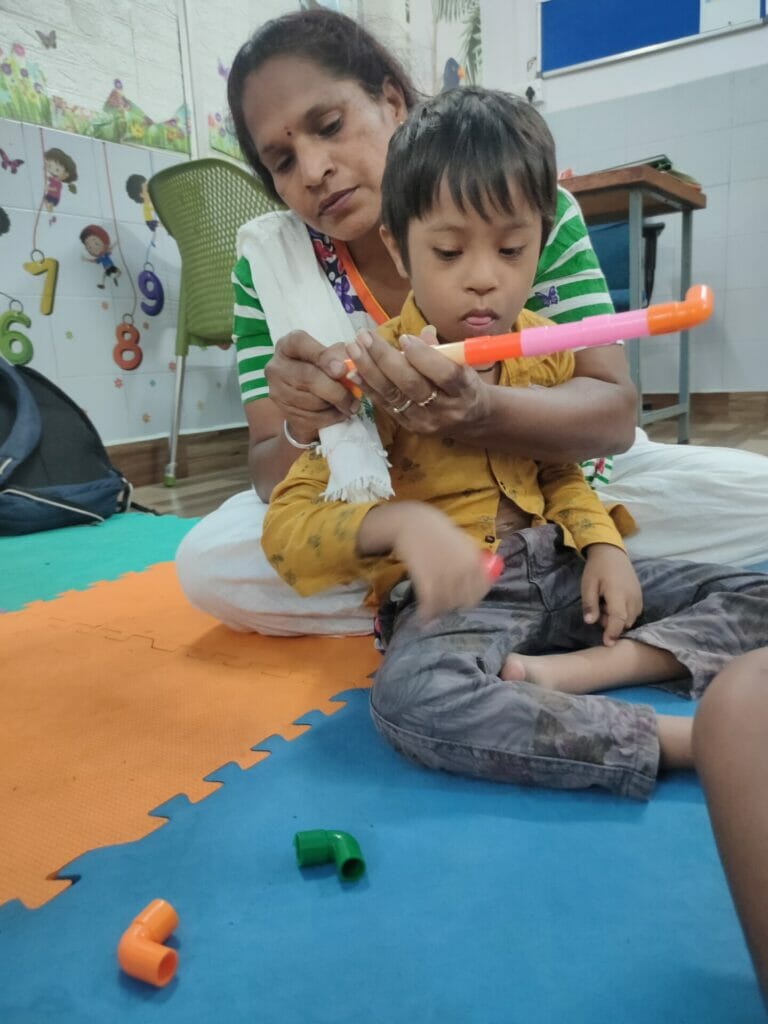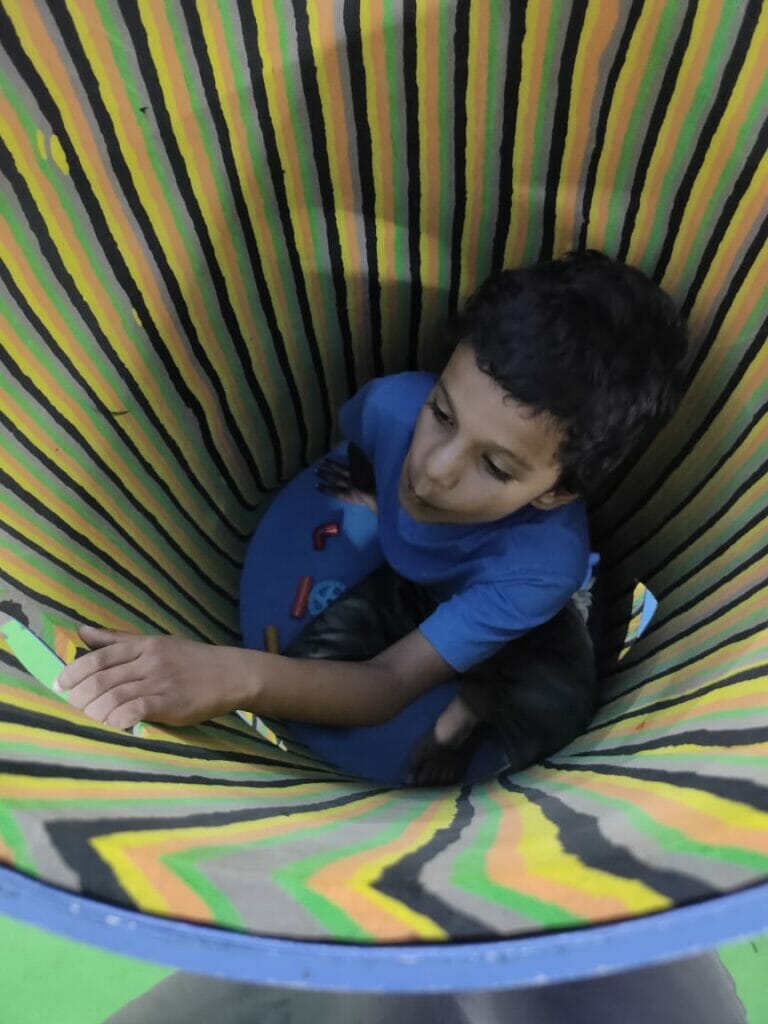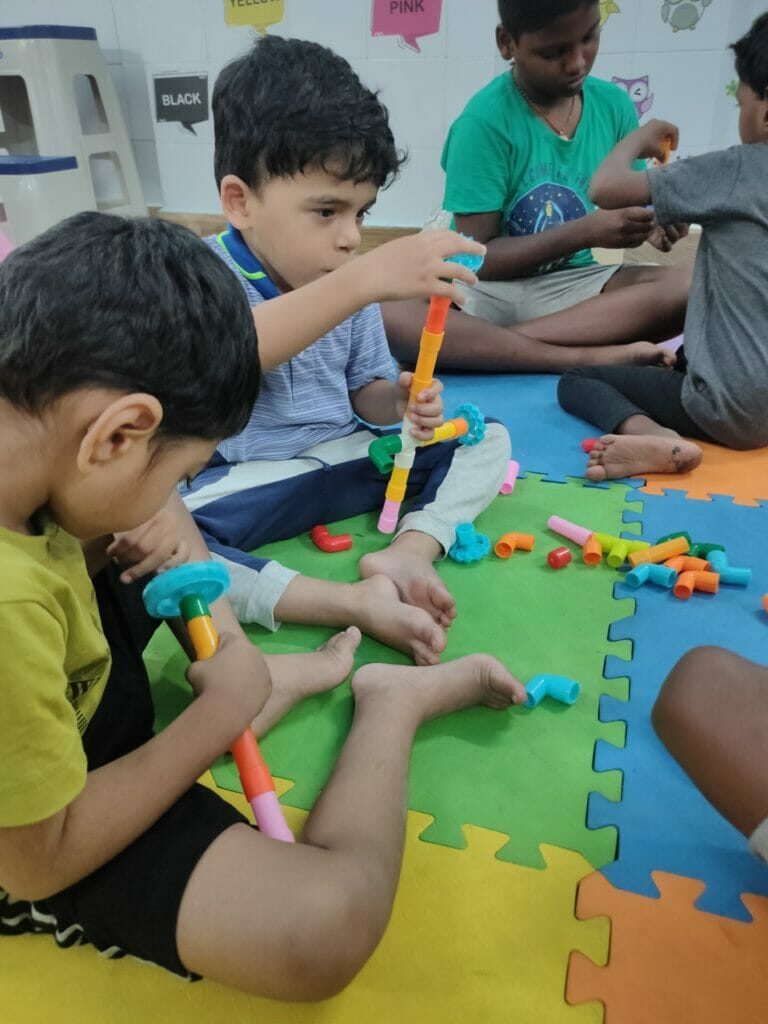About eight and half years ago, Roshni* noticed that her toddler, Karan*, had started to fall back on his milestones. A visit to the paediatrician led to Karan being diagnosed with mild autism. “From then on, it’s been a long journey,” says Roshni. The dedicated parents have taken Karan to numerous intervention centres and therapists, but keeping this going financially was proving to be a burden. That is when someone referred Roshni to The Association of People with Disability (APD), an NGO that has been working for underprivileged people with disability since 1959.
Roshni approached APD in March this year, in time for when the new Autism Unit, a project titled Embrace Me, was inaugurated.
“We were not particular about him excelling academically. We had reached a stage where we just wanted him to be able to do his daily living activities without support. In case my husband or I are indisposed, we want him to be independent,” says Roshni.
Association of People with Disability is open from Monday to Friday. It runs two batches: junior and senior. The junior batches are held between 9 am to 1 pm and has 8 children. The senior batch (age 6-12) is held between 1 pm to 5 pm (age 3-6) and has 7 children. It has two staff members – One senior physiotherapist with expertise in sensory integration and one general therapist.
Autism in India
Autism, a neurodevelopmental disorder, affects children worldwide, causing differences in social interaction, communication, and behaviour. It is characterised by a spectrum of symptoms, which can vary greatly in severity and presentation from one individual to another.
According to a report by ETHealthWorld, about 18 million people in India are diagnosed with autism, and about 1% to 1.5% of children, aged two to nine years are diagnosed with Autism Spectrum Disorder (ASD). While ASD typically becomes evident during early childhood, it may also be diagnosed at any age.
While the exact causes of autism remain unclear, a combination of genetic and environmental factors is believed to play a role. Understanding and supporting children with autism is essential for fostering their development, well-being, and integration into society. Through education, early intervention, and a nurturing environment, it is possible to empower these children to reach their full potential and thrive.
Read more: A few small steps can make public spaces inclusive for neurodivergent people too
Why the Autism Unit at APD was started
Since autism is a life-long, challenging developmental disorder, it needs tailored and evidence-based interventions. The cost associated with treatments like sensory integrations and life skill training is a lot. While efforts are being made by organisations, advocacy groups, and the government to address these challenges and improve the situation for individuals with autism and their families in India, there is still a long way to go. Continued awareness, resource allocation, and collaboration among various stakeholders are necessary to overcome these obstacles and provide effective rehabilitation and support for
individuals with autism.

“At APD, we have a structured protocol with different systems and processes that caters to each child. For example, we have a table schedule that has a 45-minute session for fitness. And during this session, we make the children do different kinds of fitness activities, including hydrotherapy. Similarly, we have free writing sessions and play. All these help the child build their fine motor skills,” says Satyashree, the Head of the Autism Unit at APD.
What is hydrotherapy? Water is used for various therapies, which works as a sensory integrator and helps in calming the children
How to apply to the APD Autism unit
The Autism Unit at APD accepts applications from carers of children of any age. Satyashree lists out the procedure:
- First, an assessment is done, based on which we categorise the children into different batches. We need to see what is the main concern, and which areas need special attention
- At present, we have 15 students here divided into morning and afternoon batches
- Children between the age of 3 years to 6 years come in the morning, and the afternoon batch has children between 6 to 12 years
An inclusive school
The NGO also runs an inclusive school on campus, the Shradhanjali Integrated School (SIS), where older children on the autism spectrum can attend classes during the day.
“This was one of the main attractions for us when we came to APD,” says Roshni. Her son, Karan, now spends his morning hours at the SIS school and walks into the adjoining autism unit in the afternoon for his sessions. “We can see that his energy is efficiently utilised. He is not restless anymore. Mingling with other children at the school has improved his social skills immensely, and the therapeutic sessions in the afternoon help him calm down. By the time he comes home, he is a happy child,” says Roshni.
Neuro-atypical children require a specific amount of repetitions and considerable specific interventions for their learning, unlike neuro-typical children. The neuroplasticity principle – Specificity, which highlights the importance of tailoring an activity or exercise to produce a result in specific circuitry, requires specific emphasis in the modern rehabilitation approaches.
Many times the therapy-oriented approaches, like sensory integrations, adapt children into a sensory world rather than directing them to a realistic functional goal. Our vision is to create functionally oriented life skill training for children, with specially integrated pictorial and augmentative communication strategies. This pilot is believed to create a realistic and evidence-based intervention model for children with Autism Spectrum Disorder.

Read more: Autism and the city: Intervention and support services widely available in Bengaluru
Services rendered at the Autism Unit
The new unit at APD has a well-structured life skill training centre, with facilities like virtual reality, interactive sense flex, experiential learning platforms, concept-based curriculum, interactive role-play, horticulture therapy, music and movement therapy, adaptive yoga, travel and domestic science, pictures EC and AAC.
With inclusion at the core of all that they do, APD has ensured services rendered at the autism unit are affordable to all. “The fee structure here varies. We conduct an assessment of the family’s socio-economic status and structure the fee accordingly. There are provisions available for BPL card holders too,” concludes Satyashree.
For BPL card holders – socio economic audit would determine the percentage of payment under A, B, C, D and E categories. D category – 25% of the therapy fee is applicable and E category is absolutely free.

Your are serving God
Hello, I am at Mumbai.I have 2 autistic children in my immediate family. Do you have any centre at Mumbai where i can seek help.
Sir,
Please start your APD unit at Visakhapatnam location. At present which location APD serving.
It’s in Bangalore (North), Karnataka
We are from kapurathala punjab my autistic child is twelve years old he is non verbal there is no therapy and special educator available. What can I do for my child.
Is there apd unit in hyderabad. If so can u provide details
Sir can you pls suggest any APD centre at Chennai
Sir,
My son is 22 yrs old he is microcephaly.. He didn’t able to talk properly… Suggest any rehab in Hyderabad.
Sir can u please tell me and in hyderabad
Plz train mother’s and start more APD centers…we need in all places …
The fee for other centers is more and its all long time …its not effortable…plz suggest